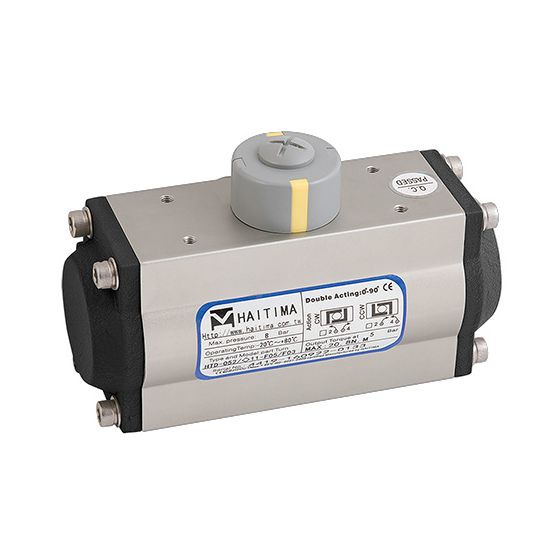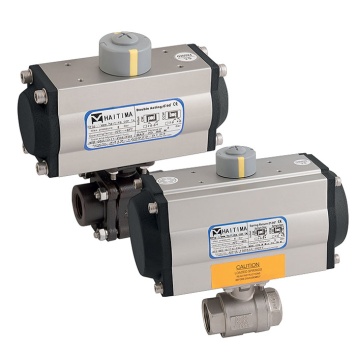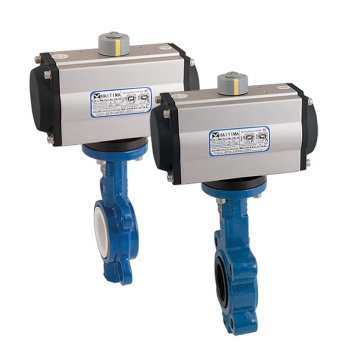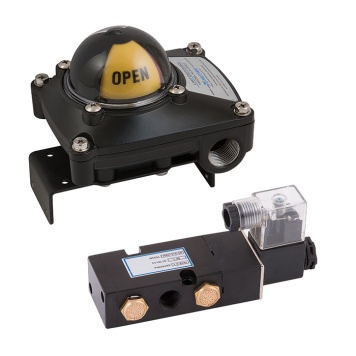Login / Register
- Home
- Actuated Valves
- Pneumatic Actuated Valves
Pneumatic Actuated Valves
Pneumatic actuated valves are vital components in various industrial processes, providing reliable and efficient automation of fluid control systems. At Pipestock, we offer a range of pneumatic actuated valves, including butterfly valves, ball valves, T-port, and L-port configurations. These valves are ideal for applications requiring robust and responsive control.
What is a Pneumatic Actuator?
A pneumatic actuator is a device that uses compressed air to generate mechanical motion to operate a valve. It converts the energy of compressed air into linear or rotary motion to control the position of a valve, allowing precise regulation of fluid flow within a system. Pneumatic actuators are widely used in industrial settings due to their reliability and rapid response times.
How Does a Pneumatic Actuator Work?
Pneumatic actuators operate by receiving compressed air from a central source or compressor. This air enters a chamber within the actuator, exerting pressure on a piston or diaphragm. The pressure causes the piston or diaphragm to move, translating the air pressure into mechanical force. This force is then used to move the valve stem or rotate the valve disc, thereby opening or closing the valve.
For example, in a butterfly valve, the actuator rotates the valve disc to regulate fluid flow. In a ball valve, the actuator rotates the ball with a hole through its center to control fluid passage.
What are the Advantages of a Pneumatic Actuator Over Electric?
- Speed and Responsiveness: Pneumatic actuators offer faster response times compared to electric actuators, making them suitable for applications requiring quick operation.
- Simplicity and Reliability: Pneumatic systems are generally simpler and more robust, with fewer moving parts, leading to higher reliability and easier maintenance.
- Explosion Proof: Pneumatic actuators are ideal for hazardous environments where electrical sparks could cause explosions, as they do not rely on electrical power.
- Force Output: Pneumatic actuators can provide higher force output relative to their size, making them suitable for heavy-duty applications.
What Industries Use Pneumatic Actuated Valves?
Pneumatic actuated valves are utilized across a wide range of industries due to their robustness and efficiency:
- Chemical Processing: Managing aggressive chemicals and maintaining safety in chemical manufacturing processes.
- Oil and Gas: Controlling the flow of hydrocarbons in extraction, processing, and refining operations.
- Food and Beverage: Ensuring sanitary conditions and precise control in food production lines.
- Water and Wastewater Treatment: Regulating the flow of water and treatment chemicals in municipal and industrial systems.
- Pharmaceuticals: Maintaining strict control over fluid handling in drug manufacturing processes.
Key Features of a Pneumatic Actuator
- Fast Operation: Pneumatic actuators provide quick and responsive valve operation, essential for applications requiring rapid actuation.
- High Force Output: Capable of generating significant force, making them suitable for operating large valves or valves under high pressure.
- Durability: Constructed to withstand harsh industrial environments, pneumatic actuators are robust and reliable.
- Fail-Safe Operation: Pneumatic actuators can be designed to return to a safe position (open or closed) in the event of a power failure, enhancing safety.
- Simplicity: With fewer moving parts compared to electric actuators, pneumatic actuators are easier to maintain and repair.
- Modularity: Many pneumatic actuators are designed with modular components, allowing for easy customization and adaptation to specific requirements.
If you require any further information, our excellent customer service team is here to help so please call us on 01794 835835.






